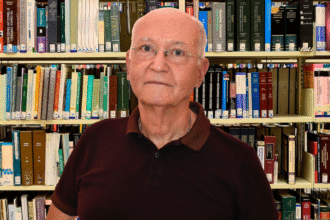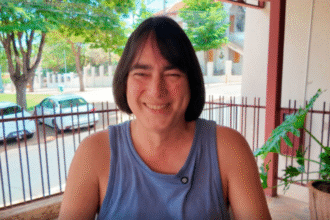The fortuitous meeting that gives the title to Eloy de Oliveira’s new book, “Apenas um esbarrão”, places reporter Clarice at the epicenter of a series of deadly events and terrifying crimes. Years of skepticism about love give way to an openness to new relationships when she bumps into deputy André Freitas on her way to work, triggering a series of unimaginable events.
Until that meeting, Clarice had sworn never to fall in love again. After becoming involved in frustrating and abusive relationships, she chose to focus on raising her daughter and achieving professional success. Both goals were achieved: she became a renowned culture reporter, and her daughter is about to graduate in Psychology. However, the romantic part of her life, which she always yearned for, remained empty due to the absence of a healthy and stable relationship.
Everything seemed to be going according to her plans until she started a relationship with the police chief, a thoughtful, friendly and good-natured man. He stands out compared to men of the past. However, only time and a deeper connection can reveal whether her image of him is truly true.
Eloy de Oliveira narrates the events with concise chapters, engaging dialogues and a plot full of mysteries to be solved. The author offers a female perspective, allowing the reader to enter the main character’s intimate struggle to overcome past traumas and seek love. In addition to being a detective novel, the book conveys the message that it is possible to find happiness, even in the face of life’s tragedies.
The title of his new book, “Apenas um esbarrão”, suggests a chance meeting that triggers a series of events. Can you tell us more about how this collision affects the life of the protagonist, Clarice?
Clarice is a woman mistreated by life when it comes to romantic relationships. She was deeply disappointed with her husband, who cheated on her, and separated. Then she met men who weren’t worth it either because of their character or their performance or both. But André Freitas, who she bumps into on the subway more than ten years after her last disappointment, is a totally different man. So much so that she considers him the last perfect person on the face of the earth. Of course she fears being disappointed again. So she tries to clear up any doubts beforehand. But as she gets to know him, she notices an André who inspires confidence, a passionate André and a surprising André. Longing for a loving relationship and pressured by her daughter, who wants her to be accompanied by someone, she gives in. They both fall in love and live a torrid romance like she never imagined. Everything would be perfect, if it weren’t for the appearance of a woman, who says that André is not who she thinks he is. From there, everything falls apart. But Clarice believes in love and goes to extreme lengths to be happy, facing deadly risks.
Clarice, the book’s protagonist, went through frustrating and abusive relationships in the past. How do these experiences shape her view of love and relationships?
Clarice’s disastrous experiences in love made her see that it’s not worth getting into relationships just to have someone. After the separation, she had this vision. It was necessary to find someone and it didn’t matter who it was, even to be able to show her ex that she was okay. This random choice made her discover that few men were equal to a woman like her. The hiatus in relationships for more than ten years, caused by the series of disappointments, appeased another of Clarice’s expectations: that a love is one that is available to her, without having to conquer it every day. She discovered that this type of relationship is not needed. In the end, Clarice concludes the obvious, but which is not obvious until you have experienced everything she has experienced: you need to know and trust a person through their actions, not through their words or appearance or conditions. The risk of disappointment will always exist, but no love can be fully experienced without dedication, without passion and without admiration, which is achieved with trust.
The book combines elements of romance and detective mystery. How did you balance these two genres in the narrative?
The central point of the narrative is that Clarice’s story is a love story. It’s the story of a woman who wants to be happy. Life is a sum of facts that are always interrelated. It doesn’t matter their origin. So, in the middle of this love story, people will emerge who have mysterious involvements, giving rise to police action. There is no way for her to know this in advance and there is no way to separate the story she will live from these facts. The balance lies in not losing the guiding thread of love.
The character of police chief André Freitas plays a fundamental role in Clarice’s life. What sets you apart from other men in your life?
The main point that makes Deputy André Freitas the last perfect person on the face of the earth for Clarice and that differentiates him from everyone else is that he is a man focused on her. He empathizes with the life she lived and knows that he has to win her over every day. For this, he is creative, surprising and willing full time. He also inspires confidence, by being clear in his attitudes and his condition in life. Being with André means for her learning the reason for her feelings, living new experiences and finding herself.
Personal tragedies and traumas from the past can often affect our ability to love and trust. How does Clarice overcome these obstacles in her search for love?
Clarice is determined. To achieve anything in life, whether personally or professionally, you need to have this disposition. She doesn’t give up at the first obstacle. Instead, she seeks to learn from her mistakes. When she takes the blows of life, she stops for a while, collects herself and invests again. Despite the gap of more than ten years avoiding relationships, Clarice still wants to be happy. But she understands that the path to this involves first having a good professional advancement and guiding her daughter. When this happens, she goes back to trying to find love. Personal tragedies and traumas are experiences that make you decide better in the present. They are not guarantees of zero error, obviously, but they greatly reduce this possibility.

Her book explores the theme of love, not just romantic love, but also self-love and love for our ideals and life. How do these different types of love intertwine in Clarice’s story?
They are present in the various moments she goes through in the story. Romantic love is her expectation to be happy with someone. When this love fails, she needs self-love to understand that she is more important than the search for love in someone else. In the meantime, she sees that she needs to seek ideals outside of romantic love to give her life meaning. Clarice is a romantic woman, but she knows that she needs to develop professionally and that she needs to guarantee her daughter’s future. These motivations, these loves, make her grow as a person.
As an author, how do you approach telling a story from a female perspective, especially when it comes to describing the main character’s inner struggle?
It’s a great challenge and it’s a pleasure to do it. I came across this venture when an unknown woman launched the proposal on a social network. She wanted to know how a man would tell this story from a woman’s perspective. The first instrument for this journey was to completely strip myself of prejudice and machismo, which are ingrained in our society. A woman who read the book told me something that made me very happy in this regard. She said that I didn’t condemn Clarice at any point. This is a sign that prejudice and machismo have truly been eliminated. Another necessary aspect was talking to women who could give me insight into what they feel and think. These conversations were fundamental. There are descriptions in the book, such as when Clarice has a sexual relationship with André for the first time that came from these testimonies. If I were to talk about how a man would take off a woman’s clothes it would be one way, but how a woman sees a man take off her clothes is completely different. There are other details about how it faces risks. I had to put a lot of feminine intuition and the fears it brings into play. I think women will identify with these passages. But not just with them. Also with Clarice’s worldview, who sees love as a saving force for the world and without which she doesn’t want to live.
The book has short chapters, lots of dialogue and several mysteries to be solved. How did you plan the structure and pacing of the narrative?
The speed of the narrative is one of the strategies to capture the reader’s attention. People are quick to think and want quick conclusions to situations. Aside from that, there’s nothing more engaging than a mystery emerging right after another is solved. People like to solve mysteries and it takes a lot of attention to build these scenarios, because it is the details that determine solutions. As the reader is hooked on the story, I cannot make mistakes in composing the details. Sometimes a situation would be much easier to construct, but I preferred to redo and change words and phrases until I reached the detail that didn’t clash with the whole. It is a construction that requires immersion in writing. When I start to describe a sequence, I go to the end before stopping just so I don’t lose the rhythm. I really liked it when the writer I invited to write the preface, a man over 80 years old, who reads more slowly, told me that he thought about reading the book in a month, but he couldn’t stop reading, doing it in a day and a half. This is a sign that the speed and rhythm are adjusted to capture the reader. He talks about this in the text that introduces the book. Interestingly, it’s the same impression that another writer had who prefaced another novel of mine, “The Last Night of Helena”, with which I competed for the 2020 Kindle Prize. It’s a type of structure that I like to do even if it’s not a book police officer.
We see that love is a guiding thread in the lives of each of us. How do you think this message might resonate with readers?
That’s my biggest desire with this novel. Love is the most important alloy we have in our relationship with the world. Without love, everything becomes cold and without seasoning. It’s as if we were machines ready to perform a certain function. No, we are human. Everything we do needs to have this love, this emotion. It is what makes situations stay in our memory. It is love that gives meaning to everything we do. If we are not passionate about what we do, we will only be reproducing movements, words and actions. Clarice fights for love to be happy and she dives into this completely passionate search, which makes all the difference. In the end, she proves that she is worth it.
In addition to “Apenas um esbarrão”, you have a diverse literary career. Can you share more about your influences and how you explore different literary genres?
I love writing. This has been with me since I was very little. To give you an idea, in my time people started school at 7 years old. I entered when I was 5. I lived a block from the school and accompanied my mother when she would take my two older brothers. I asked to stay. The director thought it was funny. My mother didn’t want it. One day I took the birth registration and went to enroll alone. The director called my mother and said what I already knew: I can’t run away anymore. He will have to come and study with us. And I went. But the decision to become a writer came with winning a writing contest in high school. That story, called “In a garden on a Sunday afternoon”, led me to the city newspaper, changing professions from electrical technician to journalist, and opened the way to other competitions. I started writing poetry, then chronicles, short stories, essays and, finally, novels. I find it very easy to write. If you give me a photo, I’ll make a story just by looking at it. Sometimes a sentence generates an entire story. A memory, well, always comes with a text. My inspirations are many. In poetry, I like Drummond, Quintana, Pessoa. In the chronicle, Dalton Trevisan, Luiz Fernando Veríssimo, Drummond. In the short stories, Conceição Evaristo, Lygia Fagundes Telles, Clarice Lispector. In romance, I have several favorite authors, but let’s close the camera to detect a style. Of all my favorites, I highlight Luiz Alfredo Garcia-Roza, a deceased writer and psychoanalyst from Rio de Janeiro. He wrote eight non-fiction books focused on his initial profession as a psychoanalyst, but, from 1996, at the age of 60, an age very close to mine today, he ventured into writing detective stories and won the Jabuti Prize, in addition to a unique notoriety in the industry. All because he deviated from the conventional Brazilian detective novels, always related to drug trafficking and weapons sales. Instead, Garcia-Roza invested in revealing unresolved personal dramas, such as that of Clarice in “Just Um Esbarrão”. This style makes my head. Of all the 12 fiction books he wrote, only one did not have the character he made famous, Chief Espinosa, a police officer who deviates from the conventional Brazilian police, someone who reads. The book where the police chief does not appear is “Berenice searches”.
Follow Eloy de Oliveira in Instagram





